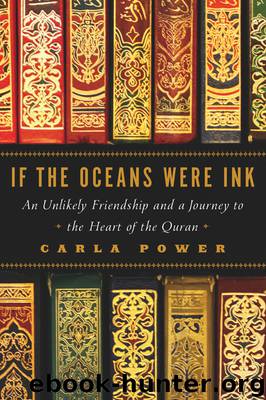If the Oceans Were Ink by Carla Power

Author:Carla Power
Language: eng
Format: epub
ISBN: 9780805098242
Publisher: Henry Holt and Co.
10
Reading “The Women”
When I told a Muslim friend of mine that I was to be studying with a sheikh, she had one request. “Ask him,” she said, “why Muslim men treat women so badly.”
When I did, he said it was because men weren’t reading the Quran properly: “If they don’t fear God, then they oppress their women.” And yet many of the men who deny their wives and daughters basic freedoms hide behind their Qurans. A favorite passage for patriarchs: the famous 4:34, the thirty-fourth verse of “The Women,” the Quran’s fourth chapter. These six lines must surely rank among the most hotly debated in the Muslim scripture. The Muslim women’s group Musawah has called them the “DNA of patriarchy” for the Islamic legal tradition. For it is here that many scholars have claimed to find Allah setting out men’s superiority and authority over women, an authority that can be backed up by force.
One popular translation, by the early-twentieth-century English translator Muhammad Marmaduke Pickthall, reads:
Men are in charge of women, because Allah hath made the one of them to excel the other, and because they spend of their property [for the support of women]. So good women are the obedient, guarding in secret that which Allah hath guarded. As for those from whom ye fear rebellion, admonish them and banish them to beds apart, and scourge them. Then if they obey you, seek not a way against them.
As debates on how to translate the verse rage online and at academic conferences, new translations suggest less sexist meanings than earlier ones. Thomas Cleary, whose work is used throughout this book, suggests a slightly more equitable arrangement—at least in the verse’s first line:
The men are supporters of the women, by what God has given one more than the other, and by what they provide from their property.
So women of integrity are humble, guardians in absentia by God’s protection.
As for those of whom you fear perversity, admonish them; then leave them alone in bed; then spank them.
And if they obey you, then seek no means against them. (4:34)
Another translation casts men as women’s “protectors and maintainers,” and yet another says that “men are to take care of women, because God has given them greater strength.” The Arabic word that Pickthall translated as “scourge,” and which other translations rendered as “beat,” Cleary translates as “spank.” But the word, notes Reza Aslan, can also mean “turn away from,” or “go along with,” or even to “have consensual intercourse with.”
One may debate 4:34’s meanings, but one thing remains certain: men’s interpretations of the verse have made millions of women miserable. Muftis, or Islamic judges, cite it to excuse domestic violence. Husbands have hijacked it to stop wives from going to graduate school, to work, or to the bazaar. The Saudi Arabian government leveraged its message to legislate a “guardianship” system in the Kingdom wherein women could not, until recently, open a business or a bank account, travel abroad, or enroll at a university without a male relative’s permission.
Download
This site does not store any files on its server. We only index and link to content provided by other sites. Please contact the content providers to delete copyright contents if any and email us, we'll remove relevant links or contents immediately.
The Lost Art of Listening by Michael P. Nichols(7506)
Why I Am Not A Calvinist by Dr. Peter S. Ruckman(4153)
The Rosicrucians by Christopher McIntosh(3519)
Wicca: a guide for the solitary practitioner by Scott Cunningham(3178)
Signature in the Cell: DNA and the Evidence for Intelligent Design by Stephen C. Meyer(3138)
Real Sex by Lauren F. Winner(3022)
The Holy Spirit by Billy Graham(2952)
To Light a Sacred Flame by Silver RavenWolf(2823)
The End of Faith by Sam Harris(2742)
The Gnostic Gospels by Pagels Elaine(2531)
Waking Up by Sam Harris(2460)
Nine Parts of Desire by Geraldine Brooks(2369)
Jesus by Paul Johnson(2362)
Devil, The by Almond Philip C(2331)
The God delusion by Richard Dawkins(2309)
Heavens on Earth by Michael Shermer(2284)
Kundalini by Gopi Krishna(2184)
Chosen by God by R. C. Sproul(2164)
The Nature of Consciousness by Rupert Spira(2108)
